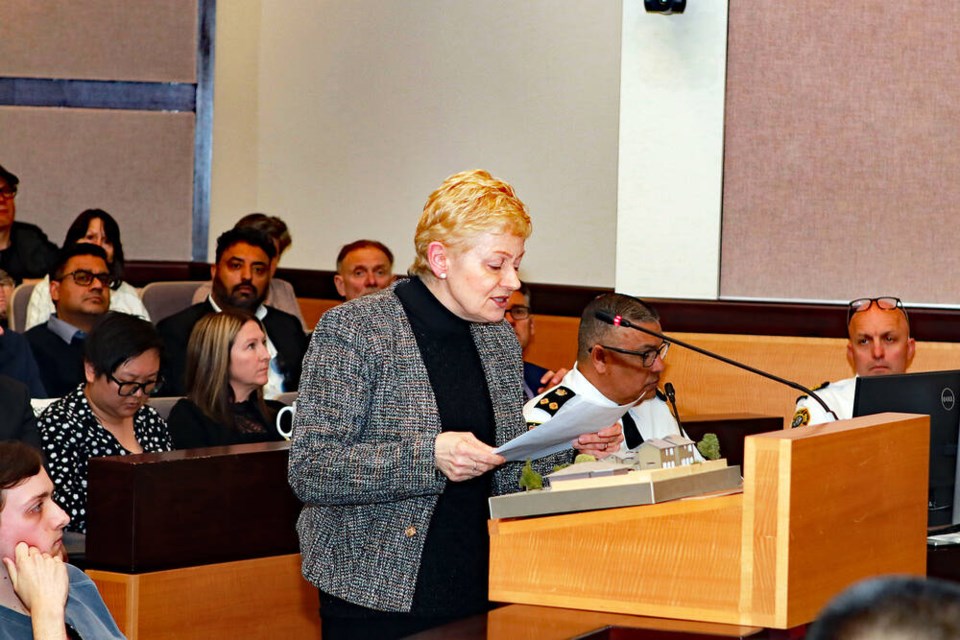The City of Delta moved a step closer to having a new Official Community Plan (OCP) after council granted third reading for the major update following a public hearing that lasted several hours on Monday.
Around 50 speakers spoke at the session at Municipal Hall, with less than in favour and the majority opposed. Most of those speaking against the proposed OCP were Tsawwassen residents who do not want the potential of high-rises in the town centre core.
Several speaking against the plan suggested new buildings 12 storeys or under would be appropriate with a couple of speakers saying the city should allow no more than six storeys in the OCP. Several reiterated the call for the city to only focus on low-rises and so-called “gentle density” as a way for Delta to meet its housing target, and also questioned the process they contend is rushed.
One resident spoke of the need to preserve the “quaintness and charm” of Tsawwassen and another spoke about their concern losing their quality of life. Others also questioned the affordability of condos in high-rises, while others claimed council was catering to developers.
Some also said they are not opposed to development but demanded responsible development.
A few North Delta residents also spoke at the hearing, some opposed to high-rises on Scott Road.
Those in favour said the OCP is a good, pro-active plan that centres densification in the appropriate areas, noting the city is in dire need of more housing variety, especially helping keep young people from being forced to leave the community.
One resident made note that the community has changed since the OCP had its last major update almost 40 years ago and the city needs to adapt.
Several also said the city finds itself in its current housing predicament due to previous councils’ inaction and fierce resistance by vocal groups of homeowners over the years imposing their opposition.
Suggestions were also made by several residents, including the city adding more co-op housing and accommodations for older adults.
North Delta resident Kathleen Higgins, a longtime advocate of small housing, who had four small homes for her family members on what was one, single-family lot, said the process for homeowners who want to redevelop is still complex and costly. She suggested pre-approved plans, lowering or eliminating fees and the city participating in home ownership programs.
After the speakers concluded, staff noted a provision, which still needs specific policy framework, for taller buildings having a developer include a “significant community amenity” which could include rental or an affordable housing component.
After the hearing wrapped up and council began its regular meeting to consider the bylaw amendment, Mayor George Harvie said it is important to move forward and do what is right for the community, including finding a way to achieve more co-op housing.
It is important to note that the timeline and the framework for the OCP was determined by the province, he said.
“As one mayor, I take great exception to being micro-managed. We are being micro-managed by the provincial government and ignored by the federal government. The federal government hasn’t provided a nickel, or a cent, to Delta…it’s all political,” said Harvie.
Coun. Dylan Kruger said the majority of projected growth in the region will happen elsewhere but Delta is still projected to need to accommodate another 40,000 people over the next 30 years, adding every city has a role to play when it comes to housing solutions.
“Contrary to popular belief, it’s not ‘build it and they will come’, they are coming already.…And yet, we have to do our part. We can’t build a wall around Delta and make the rest of the region pay for it. That kind of exclusionary rhetoric has no place in a welcoming or inclusive community,” said Kruger.
“There’s a reason Delta was placed on the provincial naughty list. We’re one of only 10 cities in British Columbia given mandatory housing targets because, by objective standards, we have not done enough. We have not kept up with the pace of growth and, as a result, the housing needs in our community far outweigh the current supply of housing.”
The new OCP still requires the Agricultural Land Commission and Metro Vancouver’s stamp of approval before council can grant final approval by the end of this June.



